现代大学英语精读二(杨立民版)Unit 4答案
- 格式:doc
- 大小:68.50 KB
- 文档页数:8
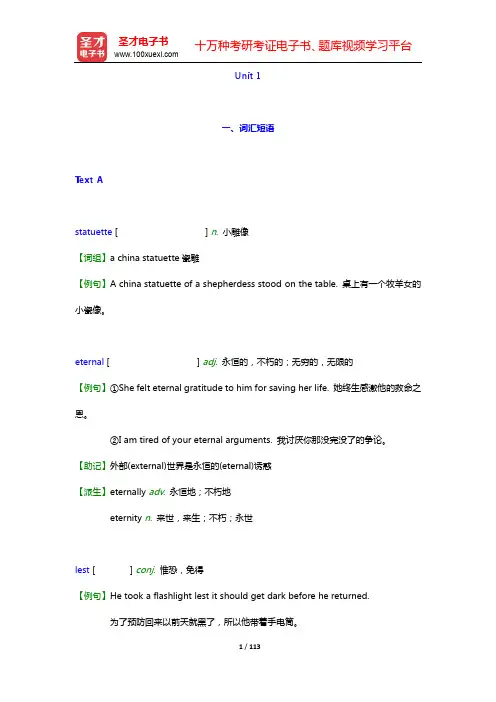
Unit 1一、词汇短语Text Astatuette [] n. 小雕像【词组】a china statuette瓷雕【例句】A china statuette of a shepherdess stood on the table. 桌上有一个牧羊女的小瓷像。
eternal [] adj. 永恒的,不朽的;无穷的,无限的【例句】①She felt eternal gratitude to him for saving her life. 她终生感激他的救命之恩。
②I am tired of your eternal arguments. 我讨厌你那没完没了的争论。
【助记】外部(external)世界是永恒的(eternal)诱惑【派生】eternally adv. 永恒地;不朽地eternity n. 来世,来生;不朽;永世lest [] conj. 惟恐,免得【例句】He took a flashlight lest it should get dark before he returned.为了预防回来以前天就黑了,所以他带着手电筒。
leopard [] n. 豹;美洲豹【词组】snow leopard 雪豹spring [] n. 春天;弹簧,发条,弹性;根源,源泉;泉水v. 跳,跃,使跳跃【例句】She sprang out of her chair to greet her father. 她从椅子上跳起来迎接她父亲。
【词组】in spring 在春天spring up 涌现,发生,出现spring from 起源于,出身于spring sth. on sb. 向某人突然说出或提出某事物(令人惊奇或猝不及防)muscular [] adj. 肌肉的;肌肉发达的;强健的【例句】Like most female athletes, she was lean and muscular.像大多数女运动员一样,她精瘦而健壮。
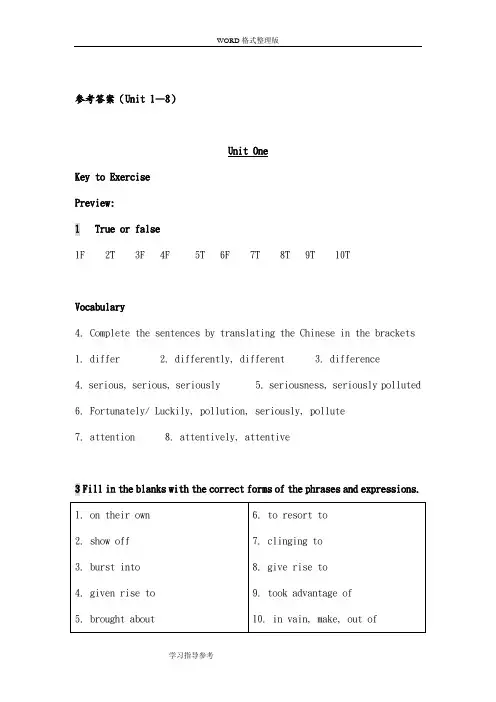
参考答案(Unit 1—8)Unit OneKey to ExercisePreview:1 True or false1F 2T 3F 4F 5T 6F 7T 8T 9T 10TVocabulary4. Complete the sentences by translating the Chinese in the brackets 1. differ 2. differently, different 3. difference4. serious, serious, seriously5. seriousness, seriously polluted6. Fortunately/ Luckily, pollution, seriously, pollute7. attention 8. attentively, attentive3 Fill in the blanks with the correct forms of the phrases and expressions.4 Translate the following sentences using words and expressions taken from the text.1. 他们利用我们求助无门的困境把我们公司接管了。
They took advantage of our helpless situation and took over our company.2. 虽然我们面前仍有困难,但我肯定我们中国人有智慧靠自己实现国家的和平统一。
Although there are still difficulties ahead of us, I am sure that we Chinese people will have the wisdom to bring abou t the peaceful unification of our country on our own.3. 只强调国内生产总值是错误的,它会引起很多严重问题。
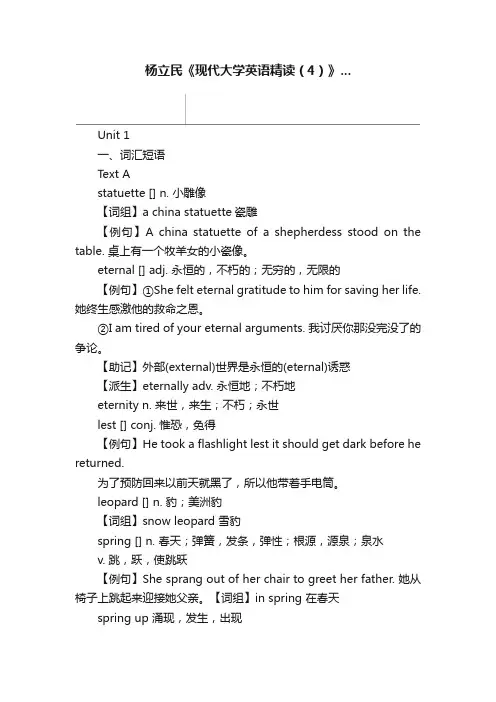
杨立民《现代大学英语精读(4)》...Unit 1一、词汇短语Text Astatuette [] n. 小雕像【词组】a china statuette瓷雕【例句】A china statuette of a shepherdess stood on the table. 桌上有一个牧羊女的小瓷像。
eternal [] adj. 永恒的,不朽的;无穷的,无限的【例句】①She felt eternal gratitude to him for saving her life. 她终生感激他的救命之恩。
②I am tired of your eternal arguments. 我讨厌你那没完没了的争论。
【助记】外部(external)世界是永恒的(eternal)诱惑【派生】eternally adv. 永恒地;不朽地eternity n. 来世,来生;不朽;永世lest [] conj. 惟恐,免得【例句】He took a flashlight lest it should get dark before he returned.为了预防回来以前天就黑了,所以他带着手电筒。
leopard [] n. 豹;美洲豹【词组】snow leopard 雪豹spring [] n. 春天;弹簧,发条,弹性;根源,源泉;泉水v. 跳,跃,使跳跃【例句】She sprang out of her chair to greet her father. 她从椅子上跳起来迎接她父亲。
【词组】in spring 在春天spring up 涌现,发生,出现spring from 起源于,出身于spring sth. on sb. 向某人突然说出或提出某事物(令人惊奇或猝不及防)muscular [] adj. 肌肉的;肌肉发达的;强健的【例句】Like most female athletes, she was lean and muscular.像大多数女运动员一样,她精瘦而健壮。
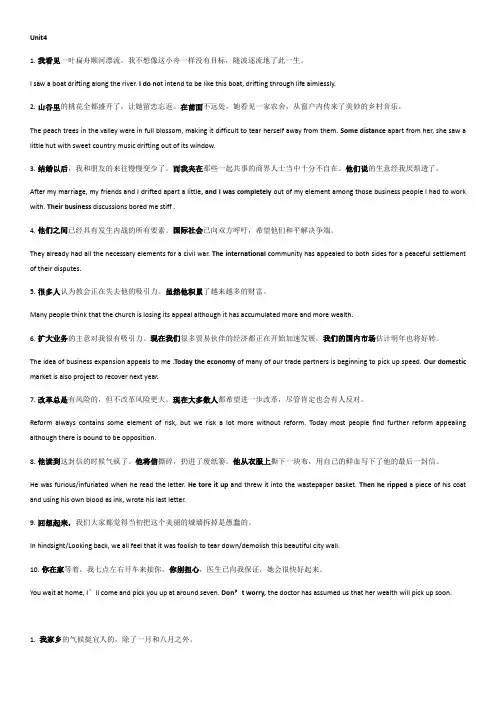
Unit41.我看见一叶扁舟顺河漂流。
我不想像这小舟一样没有目标,随波逐流地了此一生。
I saw a boat drifting along the river. I do no t intend to be like this boat, drifting through life aimlessly.2.山谷里的桃花全都盛开了,让她留恋忘返。
在前面不远处,她看见一家农舍,从窗户内传来了美妙的乡村音乐。
The peach trees in the valley were in full blossom, making it difficult to tear herself away from them. Some distance apart from her, she saw a little hut with sweet country music drifting out of its window.3.结婚以后,我和朋友的来往慢慢变少了。
而我夹在那些一起共事的商界人士当中十分不自在。
他们说的生意经我厌烦透了。
After my marriage, my friends and I drifted apart a little, and I was completely out of my element among those business people I had to work with. Their business discussions bored me stiff .4.他们之间已经具有发生内战的所有要素。
国际社会已向双方呼吁,希望他们和平解决争端。
They already had all the necessary elements for a civil war. The international community has appealed to both sides for a peaceful settlement of their disputes.5.很多人认为教会正在失去他的吸引力。
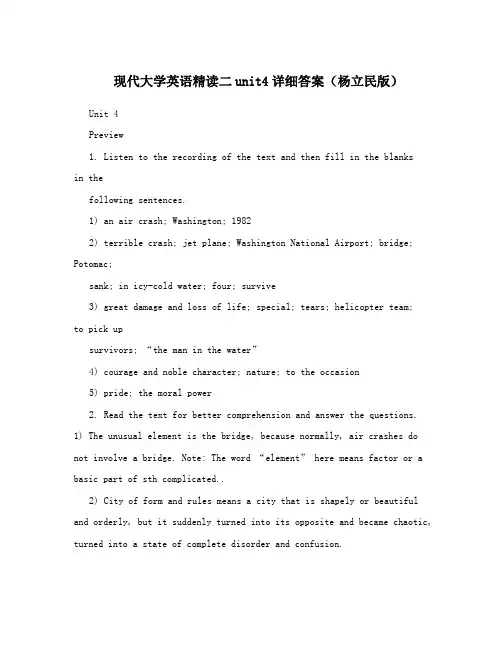
现代大学英语精读二unit4详细答案(杨立民版)Unit 4Preview1. Listen to the recording of the text and then fill in the blanksin thefollowing sentences.1) an air crash; Washington; 19822) terrible crash; jet plane; Washington National Airport; bridge; Potomac;sank; in icy-cold water; four; survive3) great damage and loss of life; special; tears; helicopter team;to pick upsurvivors; “the man in the water”4) courage and noble character; nature; to the occasion5) pride; the moral power2. Read the text for better comprehension and answer the questions. 1) The unusual element is the bridge, because normally, air crashes do not involve a bridge. Note: The word “element” here means factor or a basic part of sth complicated..2) City of form and rules means a city that is shapely or beautiful and orderly, but it suddenly turned into its opposite and became chaotic, turned into a state of complete disorder and confusion.A blast of real winter: Blast means a sudden strong movement of wind or air. The two metals here refer to the bridge and the plane, both of which are made of metal. 3) From the point of view of artistic beauty, there was also a clash, because the plane was blue and green, the river was black, and the chunks of ice were grey. Perhaps people did not see failure in it at all. They only saw the triumph of human nature over the elements.5) Here the human nature and natural powers are in conflict.6)“Rise to the occasion”: Deal successfully with a problem or situation that is especially difficult. “Groping and struggling”refers to the fact that normally it ishuman instinct to grope for something to hang on to and struggle for life. 7) The sentence means “Three out of the four acknowledged heroes…, are able to account for their behavior.”“Account for”: give a satisfactory explanation8) “in the line of duty”: while working; while on duty9) Skutnic added that somebody had to go in the water saying what every hero would say under the circumstances, but although the sentiment has been repeated by many heroes, it is still admirable.10) It means the main reason for the emotional impact or the person who caused the greatest emotional impact.11) “mass casualty”: a great number of people injured and killedin an accident or battle. The word “mass” here is an adjective, meaning affecting a lot of people. Alsomass murder; mass killings; mass destruction; mass hysteria; mass protest; mass movement.“commitment”: a sense of duty and responsibility and a determination to work hard at it.12) As his name remained unknown, it made him a sort of symbol, a symbol of what human beings can do when they are at their best.13) “listening to …” is a participle phrase used as an adverbial of manner, modifying the predicate of the main clause “sitting”;“tell …” and “saying ..” are both part of the complex object of “listening to”; and “to fasten …” is part of the complex object of “tell”.14) in the essential, classic circumstance: in the most basic and typical circumstance 15) the age-old battle between humans and nature16) go at each other: fight each other violentlyact on distinctions: act according to the distinction between good and evil; act according to moral principles17) It means that when the man in the water gave a lifeline to the people gasping for survival, in the same way he seemed to be also saving the lives of those who watched him, making them understand life’s true meaning.18) “hold it to a standoff”: make nature unable to win the battle immediately 迫使自然接受在和人的斗争中的僵持局面,使它不能马上得逞。
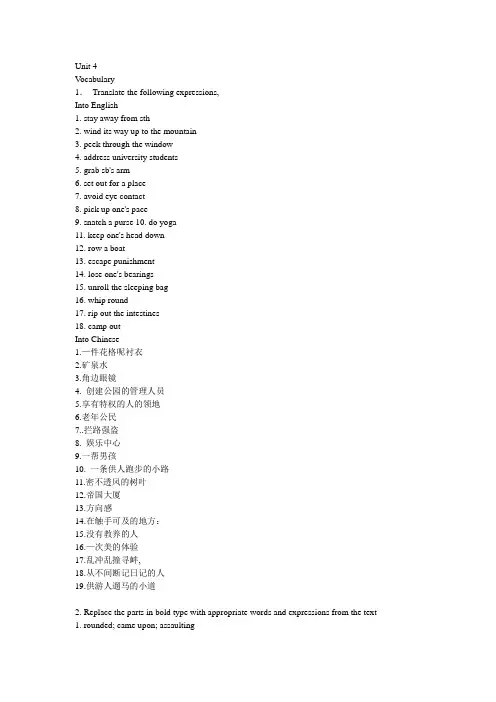
Unit 4V ocabulary1.Translate the following expressions,Into English1. stay away from sth2. wind its way up to the mountain3. peek through the window4. address university students5. grab sb's arm6. set out for a place7. avoid eye contact8. pick up one's pace9. snatch a purse 10. do yoga11. keep one's head down12. row a boat13. escape punishment14. lose one's bearings15. unroll the sleeping bag16. whip round17. rip out the intestines18. camp outInto Chinese1.—件花格呢衬衣2.矿泉水3.角边眼镜4. 创建公园的管理人员5.享有特权的人的领地6.老年公民7..拦路强盗8. 娱乐中心9.一帮男孩10. 一条供人跑步的小路11.密不透风的树叶12.帝国大厦13.方向感14.在触手可及的地方:15.没有教养的人16.—次美的体验17.乱冲乱撞寻衅,18.从不间断记日记的人19.供游人遛马的小道2. Replace the parts in bold type with appropriate words and expressions from the text 1. rounded; came upon; assaulting2. avoid eye contact; is panicking3. frighten away4. spotted; got my bearings; emboldened5. enveloped; on my own6. shrieking; whipped round7. involuntarily called up the memory of; being sexually assaulted; pick up my pace/bolt8. consume staggering quantities of9. resumed; drifted from... to another3. Translate the following sentences into English.1.I saw a boat drifting along the river. I do not intend to be like this boat, drifting through life aimlessly.2. The peach trees in the valley were in full blossom, making it difficult to tear herself away from them. Some distance apart from her she saw a little hut with sweet country music drifting out of its windows.3. After my marriage, my friends and I drifted apart a little, and I was completely out of my element among those business people I had to work with. Their business discussionsbored me stiff.4. They already have all the necessary elements for a civil war. The international communityhas appealed to both sides for a peaceful settlement of their disputes.5. Many people think that the church is losing its appeal although it has accumulated moreand more wealth.6. The idea of business expansion appeals to me. Today the economy of many of our trade partners is beginning to pick up speed. Our domestic market is also projected to recovernext year.7. Reform always contains some elements of risk, but we risk a lot more without reform. Today most people find further reform appealing although there is bound to be opposition.8. He was furious (infuriated) when he read the letter. He tore it up and threw it into the wastepaper basket. Then he ripped a piece off his coat and using his own blood as ink, wrote his last letter.9. In hindsight (Looking back), we all feel that it was foolish to tear down (demolish) this beautiful city wall.10. You wait at home. I'll come and pick you up at around seven. Don't worry. The doctor has assured us that her health will pick up soon.4.Fill in the blanks with appropriate words.1. on, into, out2. within, as, toward3. in, to4. by, out of/from5. On, up, off6. on7. with8. on, at, at9. out, to10. across, for5. Point out and correct mistake(s) you find in the following sentences.1. "Platitude" cannot be very interesting because it has been repeated so many times by so many people and you will not assume that people have most likely never heard of it.2. A day that is cold will not be muggy. "Muggy" means unpleasantly warm and humid. 'To remain away from" is not the usual phrase. We say "to stay away from."3. "His nocturnal hammering" means his hammering throughout the night. It cannot happen in the day.4.... peeked through the impenetrable foliage: If it's impenetrable you cannot see clearly. In fact you can't see anything at all.5. If you were certain where you were you would not have lost your bearings.6. We usually say "grab" or "snatch" or "seize" instead of "grasp." Besides, women often carry purses rather than wallets which are usually for men. Then, people do not bolt calmly. They bolt when they run suddenly, especially when frightened.7. The woman was so frightening: The woman was "frightened," not "frightening." she started yelling uncontrollably: People usually yell when they are angry or excited Here "scream," "shriek" or "exclaim" will be more appropriate.8. a small boulder: "A boulder" is a very large stone or rock, therefore "a small boulder" is a contradiction in terms unless the boulder is small by comparison, though still too big be called a stone, and a boulder naturally is not something your sister can swing, swung it into the lake: The usual word is "throw" (or fling, toss, pitch, hurl). To swin£ something usually means a circular movement or a movement from side to side with one end fixed.9. condescending tune: It should be "condescending tone."10. a strong cold breeze: "A breeze" cannot be strong. It is light, gentle and soft.11. If something is at its most popular, it means that it can be enjoyed by ordinary people. (Unless you specify that it is popular with a certain type of people.)12. "Glare" means a harsh bright light. It is highly doubtful that you can see twinkling stars in the sky in a glare.shockingly beautiful: "Shockingly" usually has a negative connotation"13. We do not usually associate "lovely kids" with "on a rampage." And it is highly to have parents "zooming through the park with their kids on the rampage."14. whipped round slowly: "to whip round" is to turn round suddenly.15. drizzle heavily: "Drizzle" is to rain in very small drops, "to drizzle heavily" is example of contradiction in terms.all damp through and through: "Damp" means slightly wet.6. Study the following sentences. Ray attention to euphemisms—use of pleasant, mi or indirect words and phrases in place of more accurate or direct ones.1. visit the necessary: euphemism for "going to the toilet'2. passed away: euphemism for "died"3. What he said about his relationship with the secretary was not just misleading. It w bare-faced lie. "Misleading" therefore is a euphemism. So is "behave inappropriately.4. in his birthday clothes: euphemism for "naked'5. a little argument: It couldn't have been just a little argument if one ended up with “ a blackened eye," and the other "a few stitches.6. had not had any movements for four days: euphemism for "excretion'7. night soil: euphemism for "human waste," "feces," or "excrement"8. slow achievers: euphemism for "poor students"9. elderly citizens: euphemism for "old people" a little overweight: euphemism for "obesity"10. underprivileged people: euphemism for "poor people"developing countries: euphemism for "underdeveloped countries"Grammar1. Identify the subject in these sentences, and put in the blanks the right verb in brackets.1. (every Park official, city administrator, and police officer) tells, (they) agree2. (the police) were3. (convictions) were4. (Much) is5. (struggle) is6. (suggestion) was7. (opinions) prove8. (many a man) is9. (cluster) was10. (Methodists) were11. (combination) was2. Learn more about the function and use of except1 Study and summarize the use of except functioning as conjunction and preposition. The word "except" in these 10 sentences is either used as preposition or conjunction.1 As preposition, both "except" and "except for" are used to introduce the only person, thing, action, fact, or situation about which a statement is not true. There is no difference between "except" and "except for" except that at the beginning of a sentence, you must use "except for."2 As conjunction, "except" is not used by itself to introduce a clause, and it is used with that or a w/z-word (what/when/where/if, etc.).3 "Except" is often used with a prepositional phrase, e.g. except in/by/to, etc. •4 "Except" is also often used with an infinitive phrase with or without "to."1. except + prepositional phrase2. except +1ha/-clause3. except + noun phrase4. except + to-infinitive phrase5. except for + noun phrase6. except + fo-infinitive phrase7. except for + noun phrase8. except + when-clause shortened9. except + prepositional phrase10. except + that-clause2 Complete the sentences by translating the Chinese in brackets using except.1. except an explosion2. except to play a guitar3. except (to) relieve his pain4. except for about five minutes5. anything except in music6. except maybe to those who were dying7. except in our memory, except in our expectations of it8. except that yours are a little more radical9. except in sleep/dreams10. except how they got to know the criminal's exact whereabouts3 Translate these sentences using except.1. The climate of my hometown is pleasant except in January and August.2. Except when he is unwell, Wang Ning spends about 40 minutes a day jogging.3. About his special mission he told his family nothing except that he had to be away business for some time.4. His parents know that they don't have to do much for their son except to let him be himself.5. They asked for nothing except what was rightfully theirs.3. Study and analyze the grammatical structure of these involved sentences.1. This is a compound complex sentence. The two coordinate clauses are connected by conjunction "and." In the first coordinate clause Subject: anybody Predicate: knows Object: the city's essential platitude Subordinate clauses:1) "who knows anything about New York" modifying the subject "anybody"2) "that you don't wander around Central Park," a noun clause which is in apposition to the object "the city's essential platitude"Ill the second coordinate clause:Subject: the appealPredicate: in that was (the order of the link verb **was" and the predictive "in that" being inverted)Subordinate clause: it was the thing you don't do (here it is in apposition to the subject "the appeal")"Needless to say" is a parenthetical remark expressing the writer's opinion that what he says is obvious.2. This is also a compound complex sentence. The two coordinating clauses are connected by "but." They are:1) The park is now framed... by the city... (Here "enveloped even" is a parenthetical remark.)2) ... there was no escaping the recognition that this city... was very beautiful, ("com man-made, glaringly obtrusive, consuming wasteful and staggering quantities electricity and water and energy": This can be considered a shortened concession clawwith the conjunction "though" omitted.)4. Translate paragraphs 4-6 of the selection into Chinese.他站在下车的地方正犹豫不决的时候,听见那些年轻人向他走来,不仅是从他见到那些身影所在的那个方向,其他方向也有人朝他逼近。

目 录Unit 1一、词汇短语二、课文精解三、全文翻译四、练习答案Unit 2一、词汇短语二、课文精解三、全文翻译四、练习答案Unit 3一、词汇短语二、课文精解三、全文翻译四、练习答案Unit 4一、词汇短语二、课文精解三、全文翻译四、练习答案Unit 5一、词汇短语二、课文精解三、全文翻译四、练习答案Unit 6一、词汇短语二、课文精解三、全文翻译四、练习答案Unit 7一、练习答案Unit 8一、词汇短语二、课文精解三、全文翻译四、练习答案Unit 9一、词汇短语二、课文精解三、全文翻译四、练习答案Unit 10一、词汇短语二、课文精解三、全文翻译四、练习答案Unit 11一、词汇短语二、课文精解三、全文翻译四、练习答案Unit 12一、词汇短语二、课文精解三、全文翻译四、练习答案Unit 13一、词汇短语二、课文精解三、全文翻译四、练习答案Unit 14一、练习答案Unit 15一、词汇短语二、课文精解三、全文翻译四、练习答案Unit 16一、词汇短语二、课文精解三、全文翻译四、练习答案Unit 1一、词汇短语Text Adisaster [di5zB:stE] n.灾难,灾祸;不幸【例句】These difficulties are caused by natural disasters. 这些困难都是由自然灾害造成的。
【助记】dis(不,没有)+aster(星星)→星星消失了,难道预示着灾难的来临?谐音“点扎死他”,灾难。
semester [si5mestE] n.学期;半年【例句】His writing has improved greatly in this semester. 这学期他的写作有了很大进步。
【助记】seme(看作semi半)+s+ ter(看作terra学期)→半学期beanpole [5bi:npEul] n.(插在地上供豆茎攀缘的)支竿,瘦长之人【例句】Li Ling’s elder sister is short and overweight while her younger sister is a beanpole.李玲的姐姐是个矮胖墩儿,可她妹妹却是个细高个儿。
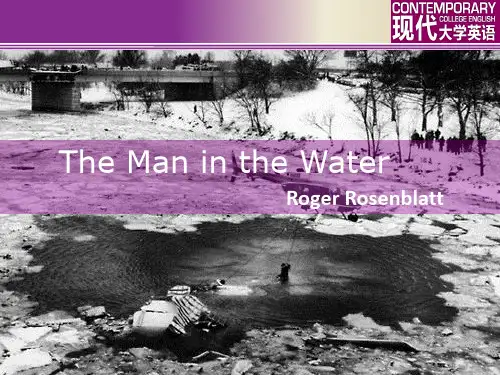
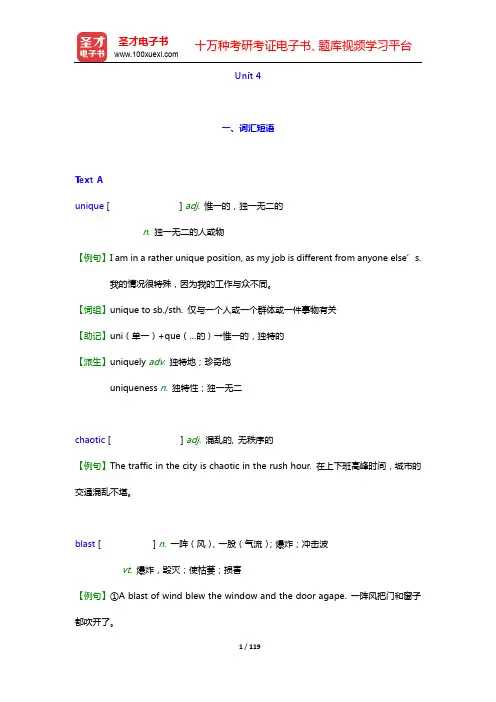
Unit 4一、词汇短语Text Aunique [] adj. 惟一的,独一无二的n. 独一无二的人或物【例句】I am in a rather unique position, as my job is different from anyone else’s.我的情况很特殊,因为我的工作与众不同。
【词组】unique to sb./sth. 仅与一个人或一个群体或一件事物有关【助记】uni(单一)+que(…的)→惟一的,独特的【派生】uniquely adv. 独特地;珍奇地uniqueness n. 独特性;独一无二chaotic [] adj. 混乱的, 无秩序的【例句】The traffic in the city is chaotic in the rush hour. 在上下班高峰时间,城市的交通混乱不堪。
blast [] n. 一阵(风),一股(气流);爆炸;冲击波vt. 爆炸,毁灭;使枯萎;损害【例句】①A blast of wind blew the window and the door agape. 一阵风把门和窗子都吹开了。
②Rock music blasted full from the parlor. 震耳欲聋的摇滚乐从客厅传来。
【词组】at full blast大力地,最有效率地【助记】b(联想:不)+last(持续)→无法持续→爆炸;毁灭【派生】blasted adj. 枯萎的;被害的;被咒的blasting n. 爆炸;破坏;由爆破而产生的碎石块;枯萎slap [] n. 击掌,拍击;侮辱;掴耳光v. 击掌击拍【例句】They started to quarrel and she slapped him on the cheek. 他们开始争吵起来,她打了他一个耳光。
【词组】slap on 随便穿上;胡乱涂上;断然拒绝jet [] n. 喷射,喷嘴;喷气式飞机;黑玉adj. 墨黑的vt. 射出vi. 射出;[航] 乘喷气式飞机【例句】Put a match to the gas jet to light the gas. 把火柴放在煤气喷口上点燃煤气。
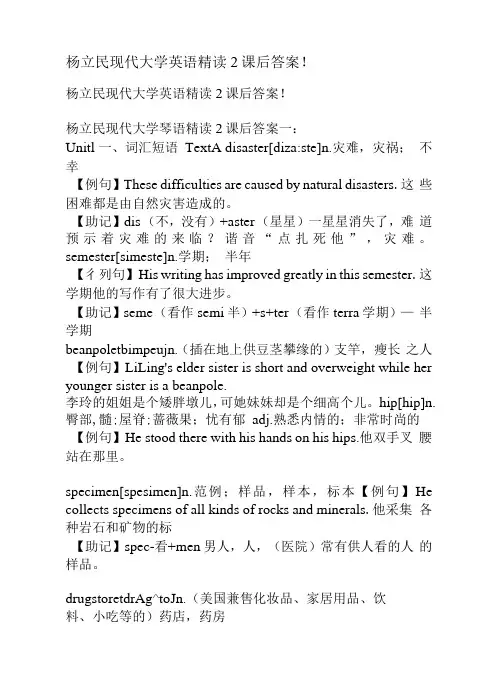
杨立民现代大学英语精读2课后答案!杨立民现代大学英语精读2课后答案!杨立民现代大学琴语精读2课后答案一:Unitl 一、词汇短语TextA disaster[diza:ste]n.灾难,灾祸;不幸【例句】These difficulties are caused by natural disasters.这些困难都是由自然灾害造成的。
【助记】dis (不,没有)+aster (星星)一星星消失了,难道预示着灾难的来临?谐音“点扎死他”,灾难。
semester[simeste]n.学期;半年【彳列句】His writing has improved greatly in this semester.这学期他的写作有了很大进步。
【助记】seme (看作semi半)+s+ter (看作terra学期)—半学期beanpoletbimpeujn.(插在地上供豆茎攀缘的)支竿,瘦长之人【例句】LiLing's elder sister is short and overweight while her younger sister is a beanpole.李玲的姐姐是个矮胖墩儿,可她妹妹却是个细高个儿。
hip[hip]n.臀部,髓;屋脊;蔷薇果;忧有郁adj.熟悉内情的;非常时尚的【例句】He stood there with his hands on his hips.他双手叉腰站在那里。
specimen[spesimen]n.范例;样品,样本,标本【例句】He collects specimens of all kinds of rocks and minerals.他采集各种岩石和矿物的标【助记】spec-看+men男人,人,(医院)常有供人看的人的样品。
drugstoretdrAg^toJn.(美国兼售化妆品、家居用品、饮料、小吃等的)药店,药房【例句】I will bring stuff from the drugstore for your hands. 我到药房去给你的手弄点药来。
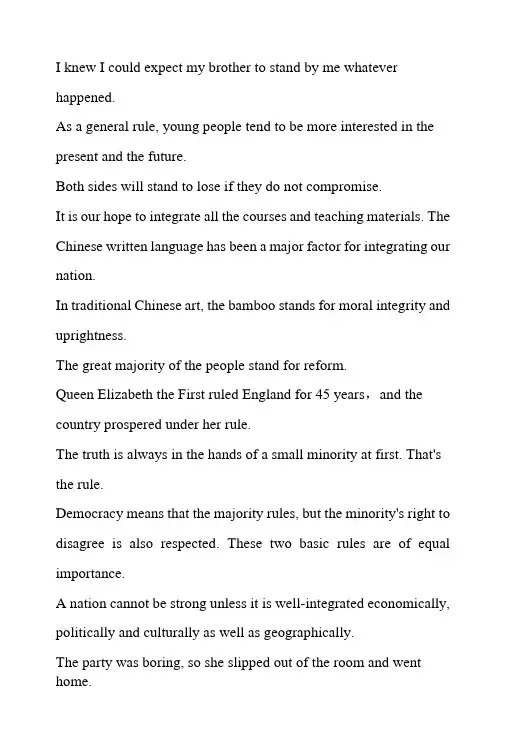
I knew I could expect my brother to stand by me whatever happened.As a general rule, young people tend to be more interested in the present and the future.Both sides will stand to lose if they do not compromise.It is our hope to integrate all the courses and teaching materials. The Chinese written language has been a major factor for integrating our nation.In traditional Chinese art, the bamboo stands for moral integrity and uprightness.The great majority of the people stand for reform.Queen Elizabeth the First ruled England for 45 years,and the country prospered under her rule.The truth is always in the hands of a small minority at first. That's the rule.Democracy means that the majority rules, but the minority's right to disagree is also respected. These two basic rules are of equal importance.A nation cannot be strong unless it is well-integrated economically, politically and culturally as well as geographically.The party was boring, so she slipped out of the room and went home.The road was muddy. He slipped and fell into the river.One day I was drowning my sorrows in a restaurant because I was broke when he came and slipped a roll of money into my hand. The Court of Florida ruled that it was necessary to recount the votes. The idea that the sun moves round the earth ruled ancient scholars for more than a thousand years.The hutongs are an integral part of old Beijing.Days slipped by and I still had not made much progress.He weighed every word carefully lest he should make a mistake. Her health was such that she would not go out in the sun even in winter lest she got sunstroke.It is a miracle how our company has become a multinational in such a short span of time.The average life span in that country has increased from 42 years to 50 years in a matter of two decades.The conflict between the two countries has spanned more than half a century.There are four bridges spanning the river.I’m much obliged to you. Without your help, I would never have finished the book.No, you are not obliged to go to the party. You don’t have to go if you don’t want to.She’s always ready to oblige when people come to her for help. In the valley is a small lake right between a meadow and a hill. It is a perfect spot for a picnic.Sitting in a shady spot, he soon dozed off.He criticized me on the spot when he saw me throw a plastic bad down by the roadside.It was a white shirt with blue spots. It looked quite pretty.The detective spotted the suspect, and he walked over and arrested him.One of the balloons popped, and it gave me quiet a start.It is very impolite to keep popping in and out of the classroom when the class is still going on.When he saw the young man ready to pay for the BMW in cash, his eyes almost popped out of his head.In those countries, water is worth a lot more than oil. Friends will often bring ten dollars’ worth of water as a gift.When this project is completed, it will benefit about a hundred thousand people. It will be well worth the effort and investment. This movie is not worth seeing twice. In fact, it is not worth seeing at all.I think it is worthwhile to visit that place. I hear they have kept alltheir traditional house intact — houses that were built in Ming-Qing styles.Jia Baoyu was sick and tired of being his father’s worthy son. He yearned for freedom.The cause of the aircraft crash is so far unknown.The cause of global warming is still hotly debated among scientists. He devoted all his life to the cause of environmental protection. The river has caused us a lot of trouble in history.What do you think caused the upsurge in international terrorism? We must try and unite with those who have opposed us.There is always opposition to any progress and reform.Some people are always opposed to new things.A lot of those loans were never repaid. That high ratio of bad debts finally led to the financial crisis in this second economic power in the world.The Business Bank now offers a special loan to students who can’t pay for their education.The boy asked Mrs. Stow for the loan of her binoculars.She concluded her speech by saying that she hoped she could come again some day and see more of the country.As soon as they concluded the investigation, they were to report tothe Security Council.During his visit, he will conclude a new trade agreement with India. Based on those reasonable doubts,the jury had to conclude that the boy was not guilty.She is flying to New York by way of Tokyo.I’d like to say a few words about the situation in the sixties of the last century by way of an introduction to the movie.They decided to recall their ambassador by way of protest. Import of the country’s beef was suspended because of the mad cow scare. During the war, they had to suspend the construction of the railway. it was a serious offence to take drugs, Robert was suspended from school for two weeks.She was reading in a hammock suspended from two tree branches. The sales suspension has brought us heavy losses.This is perhaps the longest suspension bridge in Asia.The author is very good at creating suspense.He used to watch wit great envy children of wealthy people go to school.I rather envy their school for its beautiful campus.She averted her face so that people would not see her blush.He has always had an aversion to publicity.The governmen t’s policy succeeded in averting a serious economic recession.Michael Jordan is the envy of many black kids.Every summer, hundreds of thousands of people are sent to guard the riverbanks against floods.it was not easy to get the golden apple, for it was guarded by a furious giant.Xicheng was practically unguarded so Zhuge Liang narrowly escaped being captured.The prisoners of war killed the guards and escaped into the woods. He is probably the greatest guard in the history of basketball. They took Americans off guard by launching a sudden attack on a Sunday.There were two armed soldiers standing guard at the bridge. Napoleon exhibited his military talent early in life.These exhibits are all insured and carefully guarded.When the exhibition is over,the exhibit will be given to the host country as gifts.She is going to exhibit some of her most recent sculptures at the National Art Gallery.We need to increase our oil import in the coming years to meet thegrowing Demand for energyOur profit has increased by 20% in the past two years.The number of privately-owned cars has increased five times (fivefold ) in five years.The number of mobile phone owners in our city has increased from 20 thousandto about half a million in less than 5 years.She propped her bike against a tree.The local economy is largely propped up by tourism.He was fast asleep with his head propped on a big rock.You need strong props to keep the tower from leaning any further. Flight 901 is due to land at the airport at 8:55.Many foreign observers say that the next man to land on the moon may very well be a Chinese.One of the stones they threw landed on the head of a young soldier. If you go on like this, you will land yourself in a jail.I landed a powerful punch to his chin and sent him sprawling. When you approach a drowning person, you must not let him grip your hands.Reports of the sundden appearance of these whales gripped the interest of the whole city.If she lost grip on the rope, she’d fall 1,000 feet to sure death. You mu st keep a grip on yourself. Don’t despair.Our government did everything possible to defend the value of our currency.The total value of our exports to that country in the first nine months this years has reachd $94 billion.A man who dares to waste one hour of time has not discovered the value of life.(Charles Darwin)At college, students acquire certain values. This is an important part of their education.If your value your life, quit smoking.This painting is valued at $20 million.We will achieve this result at any cost.Our economy began to grow by leaps and bounds as a result of the reform and open policy.His repressive policies only resulted in his quick fall.Many of our present problems in a way to dispose of nuclear waste. The fact that you like somebody may dispose you to like his ideas also.So far we still have not found a safe way to dispose of nuclear waste.These shoes fit me perfectly. I’ll take them.This set of furniture fits into our sitting room.The innkeeper found that the man fit the description of the wanted murder suspect.To keep fit, you should avoid eating too much salt, sugar and fat. The water was no longer even fit to swim in, let alone to drink. He was suddenly seized by a fit of laughter.She has had fits every now and then since she was a child.This subway will be extended to cover the whole city.I would like to take this opportunity to extend my heartfelt thanks to you.The effect of the economic reform will naturally extend to other fields.Many people prefer government bonds to stocks.This kind of jacket is out of stock.This is one of his stock jokes. I have heard it many times.Zhuge Liang pretended to be very calm and succeeded in fooling Sima Yi who did not know that the city was really unguarded.He pretended that nothing had happened.She pretended to be listening,but actually her mind had already wandered far away.I don’t want to pretend that I’m an expert on this subject.How would you compare your life today with your life before the reform started?If you com pare American students with Chinese students, you’ll find some interesting similarities and differences.Social Darwinists believe that we can compare our human society to the animal world.These mass-produced chickens do not compare with the chickens we used to raise at home.Our exports to that region increased by 30% compared with the same period the previous year.The water-pipe has burst. We must get it fixed immediately.It sounded like the bursting of a ballono.As usual, the Giant Panda House was bursting with children.You can see that the students are bursting with question.There were about 800 people watching a play when some thirty armed terrorists burst into the theater.The man was bursting to tell his fellow-traveler why he had pitched his suitcase out of the train window.When the prisoners burst into song, the prison warden was frightened.The spaceship left the launching-pad and rose majestically, soon becoming a little dot.The whole area is now dotted with factories.The company has camp-sites dotted around the country.Young people are more likely to rebel against old traditions.He was quite a rebel even when he was a boy.He declared that all the rebels would be pardoned if they laid down their arms.。
Unit1Phrase1.猛然敲门 bang the door2.向国王陛下欢呼 cheer His Majesty3.凝视那雕像 contemplate the statue4.设计/发明一种新方法 devise a new way5.获得一种名声 gain a reputation6.鼓舞人民 inspire the people7.低下头 sink one’s head8.象征/代表国家 symbolize the nation9.暖和双手 warm one’s hands10.毁了某人的健康 ruin one’s health11.扮演重要的角色 play an important role/part in12.解决这个问题 settle the issueSentence1.I know I could rely on my brother to stand by me whatever happened.我知道,不管发生什么情况,我都可以依靠兄弟的支持。
2.As a rule, the younger generation tends to be more interested in the presentrather than the past unlike the older generation, but both generations will stand to lose if they do not respect the other’s needs.一般来说,年轻一代与老一辈不同,他们对现在而不是对过去感兴趣。
但这两代人如果不互相尊重对方的需要,就都会遭受损失。
3.The Chinese written language has been a major factor for integrating the wholenation.中国的书面文字是国家完整统一的一个重要因素。
Key to ExercisesPreview第一大题1. This article was written in praise of the heroes and the heroism demonstrated during an air crash which took place in WashingtonD.C. in the year 1982.2. The terrible crash occurred in cold winter when a jet plane from Washington National Airport hit the bridge over the Potomac river. The plane dropped into the river and soon sank/ went under, bring many passengers down with it. Those who managed to get out of the plane found themselves in icy-cold water.3. Disasters are always terrible because they mean great damage and loss of life. As disasters go, this air crash was nothing very special. But because of the four heroes, it brought millions to tears or attention. Three of them formed a police helicopter team, andthey risked their lives again and again as they tried to pick up survivors. But the greatest hero was a man known as “the man in the water”because his name was never found. He was seen clinging to the tail of the plane with five other passengers. But every time a lifeline or flotation ring was dropped to him, he passed it on to another of the passengers. Those passengers survived. But the man did not.4. The emotional impact of this display of courage and noble character was tremendous, because it showed human nature at its best. This man in the water must have been an ordinary person. Before the air crash, he would never have guessed what a heroic deed he was going to perform that day, but when the great test came, he rose to the occasion.5. The author believes that this disaster filled people with a sense of pride rather than sadness, because in the contest between indifferent natural forces and the moral power of human beings, human beings have won.The man went down in the river, but he actually rose to immortality.第二大题1. The unusual element is the bridge, because normally, air crashes do not involve a bridge. Note: The word “element” means a factor or a basic part of something complicated.2. “A city of form and rules” means a city that is shapely or beautiful and orderly, but it suddenly turned into its opposite and became chaotic, turning into a state of complete disorder and confusion.The two metals here refers to the bridge and the plane, both of which are made of metal, or more specifically, iron and steel钢铁.3. From the point of view of artistic beauty, there was also a clash or conflict, because the plane was painted into blue and green, the river and black, and the chunks of ice were grey. Mixture of different types of color would make the viewers uncomfortable, so they would regard this scene as “aesthetic clash”.4. Perhaps people did not regard this air clash as a failure at all. They all saw the triumph of human nature over the elements.5. Here human nature and natural powers are in conflict/clash.“Groping and struggling” refers to the fact that normally it is human instinct本能;天性to grope for something to hang on to (=to hold on; to survive) and to struggle for life.6. Rise to the occasion: to deal successfully with a problem or situation that is especially difficult.7. The sentence means “Three out of the four acknowledged heroes...are able to account for their behavior”.Account for: to give a satisfactory explanation.8. In the line of duty: while working; while on duty9. Skutnic added that somebody had to go in the water saying what every hero would say under the circumstances, but although the remark has been repeated by many heroes, it isstill admirable.10. It means the main reason for the emotional impact, or the person who caused the great emotional impact.11. Mass casualty: a great number of people injured and killed in an accident or battle. The word “mass” here is an adjective, meaning affecting a lot of people. Cf: mass murder; mass killing; mass destruction; mass hysteria; mass protest; mass movement; mass unemployment; the mass media; the mass market; mass-produce v; mass-produced adj.; mass production. Derivation: massacre; massiveCommitment: a sense of duty and responsibility and a determination to work hard at it.12. As his name remained unknown, it made him a sort of symbol, a symbol of what human beings can do when they are at their best.13. “listening to...” is a participle phrase used as an adverbial of manner, modifying thepredicate of the main clause “sitting”; “tell...” and “saying...” are both part of the complex object of “listening to”; and “to fasten...” is part of the complex object of “tell”.14. In the essential, classic circumstance: in the most significant/crucial/decisive and typical circumstance15. The age-old battle between human beings and nature16. Go at each other: to fight each other violentlyAct on principles: to act according to the distinction between good and evil; to act according to moral principles17. It means that when the man in the water gave a lifeline to the people gasping for survival, in the same way he seemed to be also saving the lives of those who watched him, making them understand life’s true meaning. 18. Hold it to a standoff: make nature unable to win the battle immediately (迫使自然接受在和人的斗争中的僵持局面,使它不能马上得逞)Vocabulary第一大题第一小题1. Incompetence2. Immoral3. Impossible4. Incomplete5. Impersonal6. Incredible7. Indirect8. Immovable9. Immortal10. Impolite11. Informal12. Improper13. Impartial14. Impatient15. Incorrect16. Incapable17. Insignificant18. Impractical19. Imperfect20. Insensitive21. Impermissible22. Impenetrable23. Indifferent24. Immovable25. Invisible26. Immodest27. Immature28. Invaluable29. Invariable30. immeasurable第二小题(1) -ee: noun. One who receives(2) -eer: noun. Doer; device for(3) -ess: noun. female第三小题1.经济起飞2.欢送会3.梦想复辟4.可耻的出卖5.后续讨论6.产品用后就扔的现代经济7.使用过多的化妆品8.严重的精神崩溃9.给了个表示许可的信号10.怀疑这是有意掩盖真相11.我们叫个外卖吧12.在军事接管之后13.给学生一些讲义14.改革的好处、红利15.联盟最后的破裂16.中途退学的人17.第二天清晨仍能感觉到的酒后头昏18.出来参加投票的人不多vote第二大题1. Employer2. Unfasten3. Bad/evil4. Unidentified5. Concerned/caring/considerate/interested/sy mpathetic6. Immovable7. Impersonal8. Irresponsible9. Selfishness10. Individual/personal/specific/private/unique One and only11. Shallow12. Undress13. Slightly/somewhat/in part/partially impartial14. Deny denial15. (bride)Groom第三大题1. Air crashes/air collision and other natural disasters2. Human nature and character3. The tail section of a jet plane4. Huge chunks of ice; a huge chunk of ice5. A flotation ring6. Fasten the seat belt7. Culture/Cultural conflict/clash/collision/shock8. Flight 9119. Mechanical failure10. Human tragedy11. Harsh remarks12. Make a distinction between good and evil13. Presidential monuments14. Typical/classic/representative circumstance15. Universal character/characteristic/feature16. A public hero17. Emotional impact18. A moment of high/heavy traffic; rush hour; traffic peak19. Enduring/lasting wonder20. Air Florida21. Congressional Budget Office/Bureau/22. Mass casualties第四大题1. Refer to; known as2. In reality; as ever; responsible forNote:A small, isolated group or area:there were pockets of disaffection 不满;背叛in parts of the countryMORE EXAMPLE SENTENCESIt is calling for a new approach to nature conservation, focusing on whole landscapes rather than isolated pockets.偏远区域Famine is biting deep in isolated pockets all over the country.There are coalitions, but they're in separate pockets around the country, it is not a national coalition.ADJECTIVE [ATTRIBUTIVE]Of a suitable size for carrying in a pocket:a pocket German dictionaryPick sb’s pocketPickpocket n. thief/theft/thieve3. Brought; to tears; sticksIf you do something single-handed(ly), you do it on your own, without help fromanyone else. 单独地I brought up my seven children single-handed.我独自带大了7个孩子。
Unit 10一、词汇短语Text Aprominent [] adj. 突出的,杰出的;突起的,凸出的【例句】A single tree in a field is prominent. 田地里一棵孤零零的树是很显眼的。
【助记】pro(向前)+min(突出)+ent(形容词后缀)→向前突出→显著的【派生】prominence n. 突出;显著;突出物;卓越fascinate [] v. 使着迷,使神魂颠倒,入迷【例句】Anything to do with old myths and legends fascinates me.任何与上古神话传说有关的东西都会使我着迷。
【词组】be fascinated by被…迷住【助记】fasc(看作fast牢固的)+in(里面的)+ate→牢牢地困在里边→迷住,强烈地吸引【派生】fascinating adj. 迷人的;吸引人的;使人神魂颠倒的fascinated adj. 着迷的;被深深吸引的fascination n. 魅力;魔力;入迷posit [] vt. 安置;假定n. 假设;设想【例句】If she needs salvation, she will posit a savior. 如果她需要救助,她就会设想一个救助者。
napalm [] n. 凝固汽油;凝固汽油弹;汽油胶化剂interstellar [] adj. [航] [天] 星际的【例句】We will be interested in the heat capacity of interstellar gases. 我们感兴趣的是星际气体的热容量。
stratosphere [] n. 同温层;最上层;最高阶段【例句】This was enough to launch their careers into the stratosphere. 这足够将他们的事业推上顶峰了。
astronaut [] n. 太空人,宇航员【例句】He is an American astronaut. 他是美国宇航员。
现代大学英语第二版精读2Unit4KeytoExercisesTheManintheWaterKey to Exercises Less on 4 The Man in the Water Vocabulary 11 in compete nee2 immoral3 impossible4 in complete5 impers onal6 in direct7 in direct8 immovable9 immortal10 impolite11 in formal12 improper13 impartial14 impatie nt15 in correct16 in capable17 in sig ni fica nt18 impractical19 imperfect20 insen sitive21 impermissible22 impe netrable23 in differe nt24 immovable25 in visible26 immodest27 immature28 in valuable29 in variable30 immeasurable2) Guess the meaning of the following suffixes(1) -eeReferee; employee; payee; divorcee; trainee(2) -eervolun teer; pion eer; engin eer; profiteer;(3) -essStewardess; actress; con ductress; tigress; lion ess; duchess; coun tess; mistress;prin cess; hostess;3) T ran slate the followi ng expressi ons pay ing special atte ntio n to the compo und nouns in bold type made of verbs+adverbs.经济起飞欢送会梦想复辟可耻的出卖后续讨论产品用后就扔的现代经济脸上涂脂抹粉/化妆品用得太多8. 严重的精神崩溃9. 给了个表示许可的信号10. 怀疑这是有意掩盖真相我们叫个外买吧在那个军事接管以后给学生一些讲义改革的好处这联盟最后的破裂学校中途撤学的人第二天清晨仍能感觉酒后头昏/宿醉出来参加投票的人不多21 employer2 un faste n3 bad/evil4 uniden tified5 con cerned/cari ng/in terested/sympathetic6 immovable7 impers onal8 irresp on sible9 selfish ness10 in dividual/pers on al/specific/private11 shallow12 un dress13 slightly/somewhat/i n part14 deny15 groom31 air crashes/air collisio n and other disasters2 huma n n ature and character3 the tail sect ion of a jet pla ne4 huge chu nks of ice5 a floatati on ring6 faste n the seat belt7 cultural con flict/clash8 Flight 9119 mecha ni cal failure10 huma n tragedy11 harsh remarks12 make a disti ncti on betwee n good and evil13 preside ntial monuments14 typical/classic circumsta nee15 uni versal character16 a public hero17 emotio nal impact18 a mome nt of high traffic19 en duri ng won der20 Air Florida21 Con gressi onal Budget Office22 mass casualties41 refer to; known as2 in reality; as ever; resp on sible for3 brought; to tears; sticks4 worth; refer to; On the other hand; make a careful distinction5 came to the con clusi on; for6 takes off; on behalf of7 to be sure; care about; rise to the occasi on8 resp on sible for; acco unt for51 to; as2 on; to3 to; of4 on; in; un der5 accordi ng to; over6 with; at; at7 aga in st; for; to8 on, to9 on, to10 In/Owi ng to/Because of; of61 The fact that he was able to avoid the seem in gly in evitable crash made him a n ati onal hero.2 Of the four stude nts who risked their lives to try to drag the drow ning childre n to shore, two n ever retur ned.3 The Japa neseare known for their long life spa n. They believe they owe this to their eating habits/the composition of their diet, which contains a lot of fish products.4 I know Harris. I couldn ' t imagine a man like him making such stupid remarks.5 After testing her loyalty many times, he is now going to give her the most dan gerous task.6 I hear that Lincoln delivered an extremely powerful speech on that occasion. Whatever did he actually say?7 That this time they must be ready to challe nge death was clear to everybody. But no one regretted this move.8 As accide nts go/ As far as accide nts are concern ed, this one was not special: a crazy young man drives a car on a university campus and kills a young woman student. What is unusual is the fact that the man dares to challenge the people who want to take him to Public Security Bureau, because his father is a local police officer.9 Every time/Whe never we decide on a finan cial policy, wehave to make a clear distinction between short-term interests and Iong-term interests.10 Although it was early October, people could already be seen driving across the froze n river.Respondto or rewrite each of the remarks, using an appositive clause and the words in brackets.1. The boy ' s fear that he would fail the exam in ati on is totally groun dless.2. I have a/the feeling that the farmer ' s wife doesn ' t like the way some young people behave.3. A year after the pla ne crash, the couple still clung to the hope that their son would oneday retur n home.4. I think the police 'opinion that the victim was partly responsible for theft is ridiculous.5. The international community welcomes the news that the two countries have decided to return to the negotiating table.6. A lot of scientists don' think the result of their research is absolute proof that global warming isn ' t really happening.7. Ted decided to join the team, for he came to the con clusi on that he had more to gain tha n lose.8. Our departme nt head seems to have accepted the fact that wome n gen erally have better com muni cati on skills.1) anybody (usually in questions) / somebody (when you expect a “ yes ” answer2) anybody else ' s3) Everybody4) every one. Nobody5) no one else6) No one7) anyone (in questi ons)8) some one else9) Every one, no one10) NobodyUsing anything, somethi ng, everythi ng, nothing.1) everythi ng2) something (when “ yes ” is expected) /anything3) no thi ng4) somethi ng, any thi ng5) somethi ng6) no thi ng7) anything8) Someth ing, anything9) somethi ng(10) noth ingFill in each blank with ONE suitable word.(1) made⑵ while(3) scheduled⑷ took(5) takeoff⑹by(7) But(8) dan gerous(9) turn(10) Somethi ngQ Tran slate the senten ces using the word in brackets and an appositive clause.1. The fact that he is somebody ' s relative won ' t change our opinion of him.2. The wives of the miners trapped in the pit for three days were overjoyed by the n ews that theirmen had all bee n rescued.3. We must accept the possibility that we might be wrong.4. There ' s little hope that the patient will suvei.5. The faculty shares the opinion that the majority of this year' feeshmen are promisi ng.6. In spite of our econo mic growth, we should bear/keep in mi nd the fact that ours is still adevelop ing coun try.7. We should hear his explanation before we jump to the conclusion that he' to blame.8. There aren ' m any people who still cling to the idea that man should conquer nature ratherthan live in harmony with it.Q Ide ntify and correct the mistake(s) in each of the sen ten ces.1. Every one in our class went to the intern ati onal book fair.2. Every one of their new products became popular soon after it was laun ched.3. The Chin ese Delegati on expressed the hope that the two sides would soon stop fighting inthe area.4. I don ' t like the way (in which) he speaks to his patients.5. Is there anyone in the office?6. I think it was the director ' s fault, and nobody else is responsible for the disaster.7. Has anyone got anything importa nt to say?8. Lee Ying can' be in the library. I saw her going to the sports ground just a mome nt ago.9. If the fir efighters hadn ' t been caught in a traffic jam, they would have arrived anhour earlier.10. Not only did the medical team save many earthquake victims, but they also helped them torecover from the shock.。
Key to ExercisesPreview第一大题1.This article was written in praise of the heroes and the heroism demonstrated during an air crash which took place in WashingtonD.C. in the year 1982.2.The terrible crash occurred in cold winter when a jet plane from Washington National Airport hit the bridge over the Potomac river. The plane dropped into the river and soon sank/ went under, bring many passengers down with it. Those who managed to get out of the plane found themselves in icy-cold water.3.Disasters are always terrible because they mean great damage and loss of life. As disasters go, this air crash was nothing very special. But because of the four heroes, it brought millions to tears or attention. Three of them formed a police helicopter team, andthey risked their lives again and again as they tried to pick up survivors. But the greatest hero was a man known as “the man in the water”because his name was never found. He was seen clinging to the tail of the plane with five other passengers. But every time a lifeline or flotation ring was dropped to him, he passed it on to another of the passengers. Those passengers survived. But the man did not.4.The emotional impact of this display of courage and noble character was tremendous, because it showed human nature at its best. This man in the water must have been an ordinary person. Before the air crash, he would never have guessed what a heroic deed he was going to perform that day, but when the great test came, he rose to the occasion.5.The author believes that this disaster filled people with a sense of pride rather than sadness, because in the contest between indifferent natural forces and the moral power of human beings, human beings have won.The man went down in the river, but he actually rose to immortality.第二大题1.The unusual element is the bridge, because normally, air crashes do not involve a bridge. Note: The word “element” means a factor or a basic part of something complicated.2.“A city of form and rules” means a city that is shapely or beautiful and orderly, but it suddenly turned into its opposite and became chaotic, turning into a state of complete disorder and confusion.The two metals here refers to the bridge and the plane, both of which are made of metal, or more specifically, iron and steel钢铁.3.From the point of view of artistic beauty, there was also a clash or conflict, because the plane was painted into blue and green, the river and black, and the chunks of ice were grey. Mixture of different types of color would make the viewers uncomfortable, so they wou ld regard this scene as “aesthetic clash”.4.Perhaps people did not regard this air clash as a failure at all. They all saw the triumph of human nature over the elements.5.Here human nature and natural powers are in conflict/clash.“Groping and struggling” re fers to the fact that normally it is human instinct本能;天性to grope for something to hang on to (=to hold on; to survive) and to struggle for life.6.Rise to the occasion: to deal successfully with a problem or situation that is especially difficult.7.The sente nce means “Three out of the four acknowledged heroes...are able to account for their behavior”.Account for: to give a satisfactory explanation.8.In the line of duty: while working; while on duty9.Skutnic added that somebody had to go in the water saying what every hero would say under the circumstances, but although the remark has been repeated by many heroes, it isstill admirable.10.It means the main reason for the emotional impact, or the person who caused the great emotional impact.11.Mass casualty: a great number of people injured and killed in an accident or battle. The word “mass” here is an adjective, meaning affecting a lot of people. Cf: mass murder; mass killing; mass destruction; mass hysteria; mass protest; mass movement; mass unemployment; the mass media; the mass market; mass-produce v; mass-produced adj.; mass production. Derivation: massacre; massiveCommitment: a sense of duty and responsibility and a determination to work hard at it.12.As his name remained unknown, it made him a sort of symbol, a symbol of what human beings can do when they are at their best. 13.“listening to...” is a participle phrase used as an adverbial of manner, modifying thepredicate of the main clause “sitting”; “tell...” and “saying...” are both part of the complex object of “listening to”; and “to fasten...” is part of the complex object of “tell”.14.In the essential, classic circumstance: in the most significant/crucial/decisive and typical circumstance15.The age-old battle between human beings and nature16.Go at each other: to fight each other violentlyAct on principles: to act according to the distinction between good and evil; to act according to moral principles17.It means that when the man in the water gave a lifeline to the people gasping for survival, in the same way he seemed to be also saving the lives of those who watched him, making them understand life’s true meaning. 18.Hold it to a standoff: make nature unable to win the battle immediately (迫使自然接受在和人的斗争中的僵持局面,使它不能马上得逞)Vocabulary第一大题第一小题1.Incompetence2.Immoral3.Impossible4.Incomplete5.Impersonal6.Incredible7.Indirect8.Immovable9.Immortal10.Impolitermal12.Improper13.Impartial14.Impatient15.Incorrect16.Incapable17.Insignificant18.Impractical19.Imperfect20.Insensitive21.Impermissible22.Impenetrable23.Indifferent24.Immovable25.Invisible26.Immodest27.Immature28.Invaluable29.Invariable30.immeasurable第二小题(1)-ee: noun. One who receives(2)-eer: noun. Doer; device for(3)-ess: noun. female第三小题1.经济起飞2.欢送会3.梦想复辟4.可耻的出卖5.后续讨论6.产品用后就扔的现代经济7.使用过多的化妆品8.严重的精神崩溃9.给了个表示许可的信号10.怀疑这是有意掩盖真相11.我们叫个外卖吧12.在军事接管之后13.给学生一些讲义14.改革的好处、红利15.联盟最后的破裂16.中途退学的人17.第二天清晨仍能感觉到的酒后头昏18.出来参加投票的人不多vote第二大题1.Employer2.Unfasten3.Bad/evil4.Unidentified5.Concerned/caring/considerate/interested/sy mpathetic6.Immovable7.Impersonal8.Irresponsible9.Selfishness10.Individual/personal/specific/private/unique One and only11.Shallow12.Undress13.Slightly/somewhat/in part/partially impartial14.Deny denial15.(bride)Groom第三大题1.Air crashes/air collision and other natural disasters2.Human nature and character3.The tail section of a jet plane4.Huge chunks of ice; a huge chunk of ice5.A flotation ring6.Fasten the seat belt7.Culture/Culturalconflict/clash/collision/shock8.Flight 9119.Mechanical failure10.Human tragedy11.Harsh remarks12.Make a distinction between good and evil13.Presidential monuments14.Typical/classic/representative circumstance15.Universal character/characteristic/feature16.A public hero17.Emotional impact18.A moment of high/heavy traffic; rush hour; traffic peak19.Enduring/lasting wonder20.Air Florida21.Congressional Budget Office/Bureau/22.Mass casualties第四大题1.Refer to; known as2.In reality; as ever; responsible forNote:A small, isolated group or area:there were pockets of disaffection 不满;背叛in parts of the countryMORE EXAMPLE SENTENCESIt is calling for a new approach to nature conservation, focusing on whole landscapes rather than isolated pockets.偏远区域Famine is biting deep in isolated pockets all over the country.There are coalitions, but they're in separate pockets around the country, it is not a national coalition.ADJECTIVE [ATTRIBUTIVE]Of a suitable size for carrying in a pocket:a pocket German dictionaryPick sb’s pocketPickpocket n. thief/theft/thieve3.Brought; to tears; sticksIf you do something single-handed(ly), you do it on your own, without help from anyone else. 单独地I brought up my seven childrensingle-handed.我独自带大了7个孩子。
现代大学英语精读4第二版课后翻译答案(unit4-unit6,中英双语)Unit41.我看见一叶扁舟顺河漂流。
我不想像这小舟一样没有目标,随波逐流地了此一生。
I saw a boat drifting along the river. I do no t intend to be like this boat, drifting through life aimlessly.2.山谷里的桃花全都盛开了,让她留恋忘返。
在前面不远处,她看见一家农舍,从窗户内传来了美妙的乡村音乐。
The peach trees in the valley were in full blossom, making it difficult to tear herself away from them. Some distance apart from her, she saw a little hut with sweet country music drifting out of its window.3.结婚以后,我和朋友的来往慢慢变少了。
而我夹在那些一起共事的商界人士当中十分不自在。
他们说的生意经我厌烦透了。
After my marriage, my friends and I drifted apart a little, and I was completely out of my element among those business people I had to work with. Their business discussions bored me stiff .4.他们之间已经具有发生内战的所有要素。
国际社会已向双方呼吁,希望他们和平解决争端。
They already had all the necessary elements for a civil war. The international community has appealed to both sides for a peaceful settlement of their disputes.5.很多人认为教会正在失去他的吸引力。
Unit 4Preview1.Listen to the recording of the text and then fill in the blanks in thefollowing sentences.1) an air crash; Washington; 19822)terrible crash; jet plane; Washington National Airport; bridge; Potomac;sank; in icy-cold water; four; survive3)great damage and loss of life; special; tears; helicopter team; to pick upsurvivors; “the man in the water”4)courage and noble character; nature; to the occasion5)pride; the moral power2. Read the text for better comprehension and answer the questions.1) The unusual element is the bridge, because normally, air crashes do not involve a bridge. Note: The word “element” here means factor or a basic part of sth complicated..2) City of form and rules means a city that is shapely or beautiful and orderly, but it suddenly turned into its opposite and became chaotic, turned into a state of complete disorder and confusion.A blast of real winter: Blast means a sudden strong movement of wind or air. The two metals here refer to the bridge and the plane, both of which are made of metal.3) From the point of view of artistic beauty, there was also a clash, because the plane was blue and green, the river was black, and the chunks of ice were grey.Perhaps people did not see failure in it at all. They only saw the triumph of human nature over the elements.5) Here the human nature and natural powers are in conflict.6)“Rise to the occasion”: Deal successfully with a problem or situation that is especially difficult. “Groping and struggling” refers to the fact tha t normally it is human instinct to grope for something to hang on to and struggle for life.7) The sentence means “Three out of the four acknowledged heroes…, are able to account for their behavior.”“Account for”: give a satisfactory explanation8) “in the line of duty”: while working; while on duty9) Skutnic added that somebody had to go in the water saying what every hero would say under the circumstances, but although the sentiment has been repeated by many heroes, it is still admirable.10) It means the main reason for the emotional impact or the person who caused the greatest emotional impact.11) “mass casualty”: a great number of people injured and killed in an accident or battle. The word “mass” here is an adjective, meaning affecting a lot of peo ple. Alsomass murder; mass killings; mass destruction; mass hysteria; mass protest; mass movement.“commitment”: a sense of duty and responsibility and a determination to work hard at it.12) As his name remained unknown, it made him a sort of symbol, a symbol of what human beings can do when they are at their best.13) “listening to …” is a participle phrase used as an adverbial of manner, modifying the predicate of the main clause “sitting”; “tell …” and “saying ..” are both part of the complex object o f “listening to”; and “to fasten …” is part of the complex object of “tell”.14) in the essential, classic circumstance: in the most basic and typical circumstance15) the age-old battle between humans and nature16) go at each other: fight each other violentlyact on distinctions: act according to the distinction between good and evil; act according to moral principles17) It means that when the man in the water gave a lifeline to the people gasping for survival, in the same way he seemed to be also saving the lives of those who watched him, making them understand life’s true meaning.18) “hold it to a standoff”: make nature unable to win the battle immediately 迫使自然接受在和人的斗争中的僵持局面,使它不能马上得逞。
Vocabulary1. Do the following exercises on word formation rules.1) Turn the following into their opposite by adding in- or im-:1.incompetence2.immoral3.impossible4.incomplete5.impersonal6.incredible7.indirect8.immovable9.immortal10.impolitermal12.improper13.impartial14.impatient15.incorrect16.incapable17.insignificant18.impractical19.imperfect ;20.insensitive21.impermissible22.impenetrable23.indifferent24.immovable25.invisible26.immodest27.immature28.invaluable29.invariable30.immeasurable2)Guess the meaning of the following suffixes.(1)-eeReferee; employee; payee; divorcee; trainee(2) -eervolunteer; pioneer; engineer; profiteer;(3) -essStewardess; actress; conductress; tigress; lioness; duchess;countess; mistress; princess; hostess;3) Translate the following expressions paying special attention tothe compound nouns in bold type made of verbs+adverbs.1.经济起飞2.欢送会3.梦想复辟4.可耻的出卖5.后续讨论6.产品用后就扔的现代经济7.脸上涂脂抹粉化妆品用得太多8.严重的精神崩溃9.给了个表示许可的信号10.怀疑这是有意掩盖真相11.我们叫个外买吧12.在那个军事接管以后13.给学生一些讲义14.改革的好处15.这联盟最后的破裂16.学校中途撤学的人17.第二天清晨仍能感觉酒后头昏18. 出来参加投票的人不多2.Give the opposite of the following words.1) employer2)unfasten3)bad/evil4)unidentified5)concerned/caring/interested/sympathetic6)immovable7)impersonal8)irresponsible9)selfishness10)individual/personal/specific/private11)shallow12)undress13)slightly/somewhat/in part14)deny15)bridegroom3. Translate the following Chinese into English.1) air crashes/air collision and other natural disasters2) human nature and character3) the tail section of a jet plane4) huge chunks of ice5) flotation ring6) fasten the seat belt7) cultural conflict /clash8) Flight 9119) mechanic failure10) human tragedy11) harsh remarks12) make a distinction between good and evil13) presidential monuments14) typical/classic circumstance15) universal character16) public hero17) emotional impact18) moment of high traffic (peak)19) enduring wonder20) Air Florida21) Congressional Budget Office22) mass casualties4. Complete the sentences with the expressions listed below in theirproper forms.1)refer to; known as2)in reality; as ever; responsible for3)brought; to tears; sticks4) worth; refer to; On the other hand; make a careful distinction5)came to the conclusion; for the6)takes off ; on behalf of7)to be sure; care about; rise to the occasion8)responsible for; account for5. Fill in the blanks with appropriate prepositions or adverbs.1)to;as2)on; to3)to; of4)on; in; under5)according to; over6)with; at; at7)against; for; to8)on; to9)on; to10)In/Owing to/Because of; of6.Translate the following sentences into English.1)The fact that he was able to avoid the seemingly inevitable crash madehim a national hero.2)Of t he four students who risked their lives to try to drag the drowningchildren to shore, two never returned.3)The Japanese are known for their long life span. They believe they owe thisto their eating habits/composition of their diet, which contains a lot of fishproducts.4)I know Harris. I couldn’t imagine a man like him making such stupidremarks.5)After testing her loyalty many times, he was now going to give her themost dangerous task.6)I hear that Lincoln delivere d an extremely powerful speech on thatoccasion. Whatever did he actually say?7)That this time they must be ready to challenge deat h was clear toeverybody. But no one regretted this move.8)As accidents g o/As far as accidents are concerned, there was nothing out ofthe ordinary: a crazy young man drives a car on a university campus andkills a young woman student. What is unusual is the fact that the man daresto challenge the people who want to take him to court because his father isa local police officer.9)Every time/Whenever we decide on a financial policy, we have to make aclear distinction between short-term interests and long-term interests.10)Although it was early October, people could already be seen drivingacross the frozen river.Grammar1.Learn to use the appositive clause.1. Study the clauses introduced by that and say which are appositive clausesand which are the relative clauses.Explanatory notes:a.The appositive clause is one that explains the meaning of the previous noun.b.The “noun + appositive clause” functions as a n oun (phrase), and like a noun(phrase), it is used as subject, objects, and predicative.c.The “noun + appositive clause” form is used as the object of prepositions andof verbs that cannot be followed by a simple that-clause.d.Only a small number of nouns can be followed by an appositive clause.Among such verbs are fact, feeling, idea, news, opinion, order, suggestion.1)appositive clause in apposition to (与……同位)“the fact”2)relative clause modifying “the jets …”3)relative clause modifying “every hero’s line”4)appositive clause in apposition to “the fact”5)appositive clause in apposition to “proof”6)relative clause modifying “something”7)appositive clause in appos ition to “the conclusion”8)appositive clauses in apposition to “the fact”2. Respond to or rewrite each of the remarks, using an appositive clauseand the words in brackets.1)The boy’s fear that he would fail the examination was totally groundless.2)I have a feeling tha t the farmer’s wife doesn’t like the way some youngpeople behave.3) A year after the plane crash, the couple still clung to the hope that their sonwould one day return home.4)I think the police’s opinion that the victim was partly responsible for theft isridiculous.)5)The international community welcomes the news that the two countries havedecided to return to the negotiating table.6) A lot of scientists don’t think the result of their research is absolute proof thatglobal warming isn’t really h appening.7)Ted decided to join the team, for he came to the conclusion that he had moreto gain than lose.8)Our department head seems to have accepted the fact that women generallyhave better communication skills.plete each of the sentences with an indefinite pronoun beginning withany/every/some/no, adding ’s or else(’s) where necessary.ing anybody/anyone, somebody/someone, everybody/everyone, nobody/noone.1) anybody (usually in questions) / somebody (when you expect a “yes” answer2) anybody el se’s3) Everybody4) everyone, Nobody5) no one else6) No one7) anyone (in questions)8) someone else9) Everyone, no one10) Nobodying anything, something, everything, nothing.1) everything 2) something (when “yes” is expected) /anything3) nothing 4) something, anything 5) something6) nothing 7) anything 8) Something, anything9) something (10) n othing3.Fill in each blank with ONE suitable word.(1) made (2) while (3) scheduled (4) took (5) takeoff(6) by (7) But (8) dangerous (9) turn (10) Something4.Translate the sentences using an appositive clause.1)The fact that he is somebody’s relative won’t change our opinion of him.2)The wives of the miners trapped in the pit for three days were overjoyed bythe news that their men had all been rescued.3)We must accept the possibility that we might be wrong.4)There’s little hope that the patient will survive.5)The faculty shares the opinion that the majority of this year’s fr eshmen arepromising.6)In spite of our economic growth, we should bear/keep in mind the fact thatours is still a developing country.7)We should hear his explanation before we jump to the conclusion that he’s toblame.8)There aren’t many people who still cli ng to the idea that man should conquernature rather than live in harmony with it.5.Identify and correct the mistake in each of the sentences.1)Everyone in our class went to the international book fair.2)Every one of their new products became popular soon after it was launched.3)The Chinese Delegation expressed the hope that the two sides would soonstop fighting in the area.4)I don’t like the way (in which) he speaks to his patients.5)Is there anyone in the office?6)I think it was the director’s fault, and nobody else is responsible for thedisaster.7)Has anyone got anything important to say?8)Lee Ying can’t be in the library. I saw her going to the sports ground just amoment ago.9)If the firefighters hadn’t been caught in a traffic jam, they would havearrived an hour early.10)Not only did the medical team save many earthquake victims, but they alsohelped them to recover from the shock.。